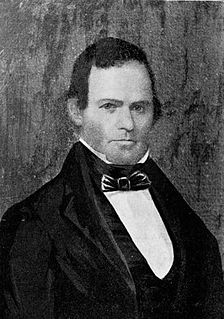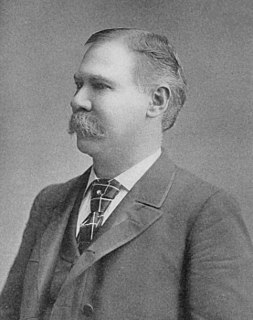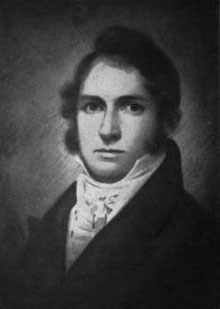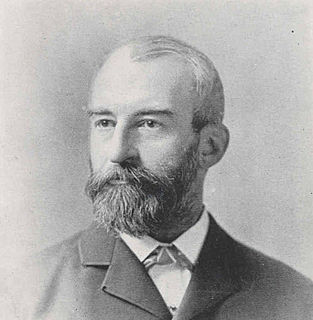
Asa Biggs was a North Carolina politician who held a number of positions. He was a U.S. Representative, a U.S. Senator, and federal judge.

Edward Payson Allen was a politician from the U.S. state of Michigan.

Hannibal Lafayette Godwin was a Democratic U.S. Congressman from North Carolina between 1907 and 1921.
Evan Shelby Alexander was a United States Democratic-Republican Party Congressman from North Carolina between 1806 and 1809.

James McDowell was 29th Governor of Virginia from 1843 to 1846 and was a U.S. Congressman from 1846 to 1851.
Lemuel Sawyer was a Congressional Representative from North Carolina.
James Iver McKay (1793–1853) was a Congressional Representative from North Carolina; born near Elizabethtown, North Carolina, in 1793; pursued classical studies; studied law; was admitted to the bar and practiced; appointed United States attorney for the district of North Carolina on March 6, 1817; served in the State senate 1815–1819, 1822, 1826, and 1830; elected as a Jacksonian to the Twenty-second through Twenty-fourth Congresses and as a Democrat to the Twenty-fifth through Thirtieth Congresses ; chairman, Committee on Military Affairs, Committee on the Post Office and Post Roads, Committee on Expenditures in the Department of War, Ways and Means Committee. Chief sponsor of the Walker Tariff, also known as the McKay Tariff, of 1846. The favorite son of the North Carolina delegation at the 1848 Democratic Convention for Vice President; McKay died in Goldsboro, North Carolina, September 4, 1853.

James Graham a Congressional Representative from North Carolina; born in Lincoln County, North Carolina, January 7, 1793; brother of William Alexander Graham; pursued classical studies and graduated from the University of North Carolina at Chapel Hill in 1814; studied law; was admitted to the bar in 1818 and commenced practice in Rutherford County, North Carolina; member of the State house of representatives in 1822, 1823, 1824, 1828, and 1829; elected as a National Republican to the Twenty-third Congress ; presented credentials as a National Republican Member-elect to the Twenty-fourth Congress and served from March 4, 1835, to March 29, 1836, when the seat was declared vacant; subsequently elected as a National Republican to the same Congress; reelected as a Whig to the Twenty-fifth, Twenty-sixth, and Twenty-seventh Congresses and served from December 5, 1836, to March 3, 1843; chairman, Committee on Public Expenditures ; unsuccessful candidate for reelection in 1842 to the Twenty-eighth Congress; elected as a Whig to the Twenty-ninth Congress ; was not a candidate for renomination in 1846; engaged in agricultural pursuits near Rutherfordton, North Carolina, where he died September 25, 1851.
Jessee Atherton Bynum was a Congressional Representative from North Carolina; born in Halifax County, North Carolina, May 22, 1796; attended Princeton College in 1817 and 1818; studied law; was admitted to the bar and commenced practice in Halifax, North Carolina; member of the house of commons of North Carolina in 1822, 1823, and 1826–1829; elected as a Jacksonian to the Twenty-second and Twenty-third Congresses and as a Democrat to the two succeeding Congresses ; moved to Alexandria, Louisiana, where he engaged in agricultural pursuits; died in Alexandria, La., September 23, 1868; interment in Rapides Cemetery, Pineville, Louisiana.

James Dixon was a United States Representative and Senator from Connecticut.
John Reeves Jones Daniel was a Congressional Representative from North Carolina.
Anderson Mitchell was a Congressional Representative from North Carolina; born on a farm near Milton, North Carolina, June 13, 1800; attended Bingham’s School, Orange County, North Carolina, and was graduated from the University of North Carolina at Chapel Hill in 1821; studied law; was admitted to the bar and commenced practice in Morganton, North Carolina, in 1830; moved to Jefferson, North Carolina, in 1831; court clerk of the superior court of Ashe County; moved to Wilkesboro, North Carolina, in 1835, and resumed the practice of law; elected as a Whig to the Twenty-seventh Congress to fill the vacancy caused by the death of Lewis Williams and served from April 27, 1842, to March 3, 1843; unsuccessful candidate for reelection in 1842 to the Twenty-eighth Congress; member of the State house of commons 1852-1854; elected to the State senate in 1860; delegate to the State convention of May 20, 1861, that passed the Ordinance of Secession, and voted against secession; was appointed judge of the superior court by Provisional Governor Holden in September 1865, subsequently elected and reelected, and served until June 30, 1875, when he resigned; died in Statesville, North Carolina, December 24, 1876; interment in the Presbyterian Cemetery.
Edwin Hickman Ewing was an American politician and a member of the United States House of Representatives for Tennessee's 8th congressional district.
Augustus Herman Pettibone was an American politician and a member of the United States House of Representatives for the 1st congressional district of Tennessee.

Rice Alexander Pierce was an American politician and a member of the United States House of Representatives for the 9th congressional district of Tennessee.
Archibald Henderson was a Congressional Representative from North Carolina; born near Williamsboro, Granville County, North Carolina, August 7, 1768; attended the common schools, and was graduated from Springer College; moved to Salisbury, North Carolina, about 1790; studied law; was admitted to the bar and commenced practice in Salisbury; clerk and master in equity 1795-1798; elected as a Federalist to the Sixth and Seventh Congresses ; member of the State House of Commons 1807-1809, 1814, 1819, and 1820; resumed the practice of law in Salisbury, N.C., and died there October 21, 1822; interment in the City Cemetery.

Alney McLean was a United States Representative from Kentucky. McLean County, Kentucky is named in his honor.
Harry Skinner was a U.S. Representative from North Carolina, and the brother of U.S. Representative Thomas Gregory Skinner.

William Hayne Perry was a United States Representative from South Carolina. He was born in Greenville, South Carolina, where he attended Greenville Academy, and graduated from Furman University at Greenville in 1857. He also attended South Carolina College at Columbia, South Carolina and graduated from Harvard University in 1859. Later, he studied law in Greenville and was admitted to the bar in 1861 and commenced practice in Greenville.
A special election will be held in 2019 to fill the vacancy in North Carolina's 3rd congressional district in the United States House of Representatives for the remainder of the 116th United States Congress. Walter B. Jones Jr., the incumbent representative, died on February 10, 2019. Parties will hold primaries to decide their nominees. In order to win a party nomination outright, a candidate must exceed 30% of the vote to avoid a runoff. This means that for the Republican Party nomination the winning candidate would have to win over 5 times as many votes as the average votes received among the 17 candidates if no candidates withdraw. There must be 30 days of absentee voting prior to each election, according to state law. Filing began on March 4 and ended March 8, as set by Governor Roy Cooper. Cooper set the primary date of April 30. If needed, primary runoffs will occur on July 9, and the general election will be on September 10. However, if no primary runoffs are needed, the general election will occur on July 9.











